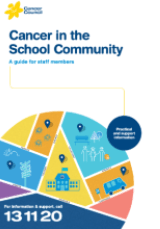- Home
- About Cancer
- Schools and teachers
- Cancer in the school community
- When a staff member has cancer
- Cancer in the workplace
Cancer in the workplace
Many employees continue to work while undergoing cancer treatment. Whether a person is able to work depends on the kind of work they do, the type and stage of cancer, the type of cancer treatment and any side effects from treatment. It also depends on personal factors such as their other commitments and whether they want people to know about the diagnosis.
Flexible work arrangements
If a staff member continues to work during treatment, they may need flexible working arrangements or to have their role modified. For example, some employees having chemotherapy may need to arrange a non-contact role with students to reduce their risk of catching an infection.
Returning to work after treatment
As more people are diagnosed in early stages – and as survival rates and treatments improve – it is increasingly likely that an employee will return to work after treatment or continue to work during treatment in some capacity. Cancer survivors are more likely to return to their job if they have a supportive work environment.
Returning to work after treatment can be difficult. School staff returning to work are often anxious about how they will manage cancer-related fatigue, employer expectations, and changes in their appearance, workload, productivity and relationships with colleagues and students.
Rights at work
Cancer Council’s online workplace fact sheets assist employers and workplaces to provide a supportive and fair work environment for people affected by cancer.
The fact sheets cover topics such as Managing the effects of treatment, Creating cancer-friendly workplaces and Supporting a colleague with cancer. For more information about employees’ rights at work, you can:
- contact your local education authority
- visit the Fair Work Ombudsman for information about workplace rights and employee relations
- visit the Australian Human Rights Commission
- call Cancer Council 13 11 20
The hardest part is going for tests. I had constant tests – three-month tests, different scans, doctors’ appointments. It takes it out of you.
– Read more of Susan’s story
→ READ MORE: Dealing with side effects
More resources
Claire Tobin, Principal Medical Advisor, Department of Education and Training, VIC; Dr Antoinette Anazodo, Paediatric and Adolescent Oncologist, Sydney Children’s Hospital and Prince of Wales Hospital, Director of The Sydney Youth Cancer Service, and Conjoint Senior Researcher, University of New South Wales, NSW; Lisa Barrow, Clinical Nurse Educator, Children’s Cancer Centre, Royal Children’s Hospital, Melbourne, VIC; Margo Bulic, Psychosocial Support Worker, CanTeen, ACT; Amber Copeland, 13 11 20 Consultant, Cancer Council Queensland; Donna Drew, Clinical Nurse Consultant, Paediatric Oncology/Palliative Care, Kids Cancer Centre, Sydney Children’s Hospital, Randwick, NSW; Allesha Fecondo, Education Consultant, Victorian Paediatric Rehabilitation Service, and Education Liaison, Ronald McDonald Learning Program, Ronald McDonald House Charities Australia, VIC; John Friedsam, General Manager of Divisions, CanTeen Australia, NSW; Pina Hutcheson, President, Catholic Primary Principals’ Association of WA; Cara Irvine, Year 8 Coordinator, Alfred Deakin High School, ACT; Andrew Long, Assistant Director, Policy and Research, Independent Schools Council of Australia, ACT; Dr Alistair Lum, Post-doctoral Research Fellow – Behavioural Sciences Unit, Sydney Children’s Hospital, University of New South Wales, NSW; Kristine Luszczynski, Learning Program Manager, Quality and Standards, Ronald McDonald House Charities Australia, NSW; Anita Neville, National Manager, Ronald McDonald Learning Program, Ronald McDonald House Charities Australia, VIC; NSW Department of Education, NSW; Mandy Roney, Consumer; Shannon Rush, Primary School Program Manager, Camp Quality, SA; Luke Wade, Education and Career Support Consultant, Redkite, QLD.
View the Cancer Council NSW editorial policy.
View all publications or call 13 11 20 for free printed copies.
Need to talk?
Support services
Coping with cancer?
Speak to a health professional or to someone who has been there, or find a support group or forum
Work and cancer
Information for employees, employers and workplaces dealing with cancer
Cancer information
Key questions about cancer and work
What you need to tell an employer and what support you can expect
Cancer in the School Community – Chapter 5
Click on the link above to download the information on this page as a PDF

